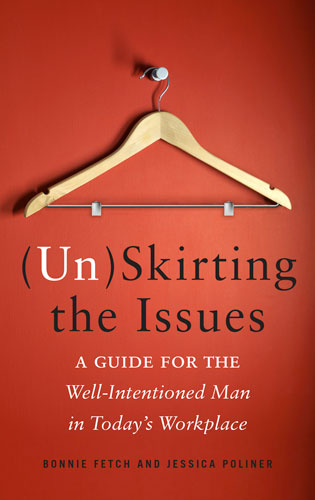Working together, men and women can begin building an inclusive work environment that benefits everyone.
Men are from Mars and women are from Venus—but when it comes to the workplace, everyone needs to come down to Earth. While countless books are aimed at helping women to thrive in business and are focused on “fixing” their idiosyncrasies, very few are aimed at equipping men to lead the journey toward gender inclusion. It’s time to engage men in a meaningful way to push toward a new future in the workplace—and Bonnie Fetch and Jessica Poliner are just the successful women to engage and advise them.
In (Un)Skirting the Issues, Fetch and Poliner present thoughtful suggestions for Well-Intentioned Men (a defined term in the book) to recognize and address the unconscious bias, stereotypes and ingrained expectations that affect women today. Pairing personal stories with authoritative research and practical tips, along with a healthy dose of humor, this guide provides men with steps they can take to influence cultural and organizational change. Working together, men and women can understand, approach, develop and advocate for change—and begin building an inclusive work environment that benefits everyone.
 It’s important to highlight the obvious: women are complex beings. While it may be improbable, if not impossible, to completely understand women, the authors have set out to help men recognize and address the unconscious bias, stereotypes and ingrained expectations that affect women in the workplace today. They do this by sharing stories, research and a healthy dose of humor to compel men to understand and advocate for much-needed change in the work environment that will benefit everyone. Fair warning: some of the stories will surprise or even shock readers. But rest assured, the stories highlighted are not one-off situations—they’re situations that occur at an alarming rate, even in the current decade.
It’s important to highlight the obvious: women are complex beings. While it may be improbable, if not impossible, to completely understand women, the authors have set out to help men recognize and address the unconscious bias, stereotypes and ingrained expectations that affect women in the workplace today. They do this by sharing stories, research and a healthy dose of humor to compel men to understand and advocate for much-needed change in the work environment that will benefit everyone. Fair warning: some of the stories will surprise or even shock readers. But rest assured, the stories highlighted are not one-off situations—they’re situations that occur at an alarming rate, even in the current decade.
The Well-Intentioned Man
Along the way, the authors have both encountered men who are aware that there is gender bias and exclusion in the workplace and who notice the ill effects on their teams. They are men who want to be part of the necessary change, but who have either been cowed into silence, afraid of offending anyone by saying the wrong thing, or who have no idea what to say in the first place. The authors have distinguished these colleagues as an archetype referred to as a “Well-Intentioned Man” (WIM, for those who have grown to like acronyms as much as the authors do).
WIMs are the men for whom they’ve written this book, and if you’re reading it now, there’s a good chance that you’re a Well-Intentioned Man. Bonnie and Jessica feel passionate in the mission to lead women through some of the more challenging career situations that they’ve had to navigate, and they know that they’re well equipped to give women the right advice from their countless and continuous experiences. However, they also see a significant additional opportunity: there’s a huge knowledge gap out there when it comes to advice for men.
Most of the advice and literature out there is for women. How to dress, how to speak, what to keep under wraps—there’s a whole genre of books out there meant to help women assimilate, cope and compete in a work environment designed by and built for men. Men and women alike have discerned that the environment itself needs to be rethought and redesigned. However, the vast majority of literature out there paints a picture of why women need to be the ones to change. The Well-Intentioned Man who wants to move toward gender equality has very little actionable advice to go on. He generally needs to rely on a female colleague to either bail him out when he gets in hot water or to pre-read his communications and role-play his counsel to make sure he doesn’t land there in the first place.
The playing field needs to be more balanced. Gender equality is the destination at the end of a long road, but what this book talks about is a step before that: simply, gender inclusion. Women need to be included in the conversation. They need to be included in considerations at every level, or the shape and flavor of the professional landscape will remain squarely male-focused. Women need to be included, and they need Well-Intentioned Men to include them.
Moving the Needle
The authors first met each other and formed a connection based on a mutual desire to help women personally and professionally in their workplace. Truth be told, Bonnie reached out to Jessica to better get to know this high-potential, younger woman in her company and to see her in action. Very quickly, they realized the power of collaborating with one another. They’d both taken on a mentoring and coaching role with friends and colleagues in the past, and together they recognized the specific need that exists within companies to enhance the confidence, assertiveness and business navigation skills of female colleagues. Madeleine Albright’s famous quote—“There’s a special place in hell for women who don’t help other women”—is always at the forefront of their minds. Jessica, especially, grew up around driven, strong, smart women, and so helping to raise up other women and pay it forward has been a natural extension of her upbringing.
Even with the beneficial results they’ve seen from their individual coaching, however, both of them have realized that all the coaching sessions and support in the world—woman to woman or through a multitude of conferences, panels, books and events—isn’t going to be enough to engender the kind of change needed in the workplace. Men must get involved, and women need to involve them in a meaningful and respectful way.
Many companies are now aware that they need to make gender inclusion a priority, but the results aren’t happening fast enough. Part of this slow pace is the sheer size and complexity of today’s corporations. For companies with locations that span the globe, it takes a long time for lasting initiatives to ripple out from the epicenter of the organizations. To date, most of the momentum has been generated by women. Jessica and Bonnie know that they can help this shift happen with what they call “inverse support”—education and support for men who want to be part of the change, and even for men who don’t yet realize that they can be part of the change.
Jessica and Bonnie’s aim is to give Well-Intentioned Men the insight and advice to get involved in this effort, to start moving the needle, and to truly accelerate change.
We All Rise Together
The intention of this book is to (un)skirt the issues creating and perpetuating bias in the workplace. The authors aim to bring to light some of the most common pitfalls in male-oriented dialogue and behavior within the workplace, and to provide simple practices for men looking to improve their interactions and gender inclusiveness. The intention is to equip the Well-Intentioned Man to better handle those daily, sticky situations, and to give them practical advice and motivation to join in the advocacy for a truly inclusive work environment.
Teams are more functional, productive and effective when the widest landscape of views and ideas are taken into account. A perspective other than the status quo—male, white, balding and middle-aged—in the workforce will advance business and cultural development further than the status quo ever could. Human progress is set on a timeline of inclusion; the more we’ve become connected across cultures, geographies and identities, the further we’ve advanced in every field you can think of. Gender inclusion is no different, and with this book, Bonnie and Jessica hope to give men the knowledge and confidence they need to advocate for gender inclusion across industries and throughout the working world. iBi
(Un)Skirting the Issues: A Guide For The Well-Intentioned Man in Today’s Workplace by Bonnie Fetch and Jessica Poliner was published in September 2017. For more information, visit unskirtingtheissues.com.


